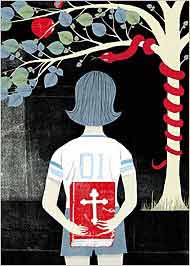With author J.K. Rowling declaring she’s written the last of the Harry Potter titles, there’s a panic coming from the publishing world that there will be nothing to take Harry’s place. I suppose this fear anticipates the readership’s sadness, it certainly expresses the commercial concern, but it cloaks itself in a [Scholastic] librarian’s voice: whatever now will the children find interest in reading?
Harry Potter has been around for ten years. Educators like to credit him for pulling children from the terminus of their gaming consoles. If Potter has created an upsurge in reading, I ask you, to where has it led? Ten years is enough to have nourished the new generation. Over 325 million Rowling books have been sold. The first Harry Potter readers are already graduated from college. What are they doing?
It’s a leading question, because I haven’t an answer. It’s not discernible. Blogs, Myspace, trivia-tourism, what? I’ll confer with college professors and get back to you, but it certainly isn’t the Peace Corps.
I would purport that the Scholastic [1] worship of Harry betrays a lack of faith in what it means to read. Do children need to be rewarded for reading? Is not escaping into the abstract a pleasure unto itself? I thought it was a fundamental need that even distinguishes us as human beings. Do we have to offer candy bars to induce people to eat? I’m sure humans can run themselves out of gas out of sheer distraction, but I know appetite is inherent.
A key is to educate children that there’s a world beyond theirs, an abstraction beyond their horizon, which can be explored through reading. Much of it, history, thought, imagination, lies only in books. Travel and science can lie beyond if they wish. Those subjects are taught in school, via reading. Teachers who suspect their students haven’t bought into reading are obviously not grading to challenging standards.
Through books lies an existence of infinite proportion, as n approaches the finite lifetime. Are the Potters hypothesizing that children must be coaxed into this world, without regard that it might be form over substance? Do children whose thumbs twitch for video games need to be lured by books that feel like video games which lead, like arcades and the pool halls before them, nowhere? With Harry Potter, are we creating readers or are we killing them off? Form has become the new substance, which to some sounds clever and new, but really means empty is the new full.
Dead Zone
There’s something happening outside the Mississippi Delta where man’s agricultural runoff, waste and industrial pollutants meet the sea. It’s being called a Dead Zone, which describes it literally, and it’s growing. The phenomena is a total collapse of the ecosystem leaving Hypoxia, the absence of oxygen in the water. It starts with the algae, then never mind every next link in the food chain [2]. We’ve measured it only since 20 years ago. Doubtless it started earlier. Doubtless too it’s happening exponentially in every estuary downstream of overpopulation. I read about Hypoxia overtaking Lake Victoria in Africa, rendering it a sinkhole, the social repercussions of which match Dante.
I cannot but wonder if such a consequence of pollution cannot manifest itself on the human population. Could not our minds become sink holes? Could not a culture or generation be faced with a Dead Zone?
Debilitating, not irreversible in the grand scheme, but certainly final, like stunted growth. Generations of minds shrunk below capacity, below what we might have wished for them, like fingers crippled by the early industrial age. A dead zone of thought, of initiative or motivation, of energy needed to get out of the dead zone. Why it’s called a dead zone, not merely an empty one.
Booksellers seem happy as snakes to see our children want sugar instead of oxygen.
Footnotes
1. The publishers of Harry Potter, Scholastic Press, is a commercial enterprise, not an educational concern as the name implies. It’s like the pseudo-junk food company Subway, owned their ads say, by Doctors Associates, Inc.
2. Overuse of synthetic fertilizers has been causing rising hypoxia on every coast. The excess nitrates lead to blooms of algae which pull all the oxygen from the water, knocking the breath from all other living things. So my analogy is closer than I intended.
 Chalk up another gloomy portent. Hope is dead. After months of pretending to be a progressive mole in the White House, Barack Obama at West Point confirmed his actual dark nature. More troops not fewer, war not peace. Today those who’ve read Obama’s books can no longer pretend he is undertaking measured change. Others who think he cannot overreach without facing certain assassination must ask themselves what benefit is such a figurehead alive or dead?
Chalk up another gloomy portent. Hope is dead. After months of pretending to be a progressive mole in the White House, Barack Obama at West Point confirmed his actual dark nature. More troops not fewer, war not peace. Today those who’ve read Obama’s books can no longer pretend he is undertaking measured change. Others who think he cannot overreach without facing certain assassination must ask themselves what benefit is such a figurehead alive or dead?
 Let’s clear something up for the sake of poetic justice. Uncle Tom was a maltreated slave who bore his burden with dignity. He was no collaborator, no stool pigeon, no upper class of black slave that kept the lower savages in order. That “Uncle Tom” is what the term has come to mean: a white man’s black man, owing perhaps to the original character’s civilized humanity which a white reader might not have expected to be a capacity of an African slave. The neo-Uncle Tom is a Tutsi.
Let’s clear something up for the sake of poetic justice. Uncle Tom was a maltreated slave who bore his burden with dignity. He was no collaborator, no stool pigeon, no upper class of black slave that kept the lower savages in order. That “Uncle Tom” is what the term has come to mean: a white man’s black man, owing perhaps to the original character’s civilized humanity which a white reader might not have expected to be a capacity of an African slave. The neo-Uncle Tom is a Tutsi. Did you hear in Ghana today
Did you hear in Ghana today 